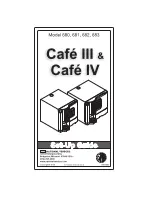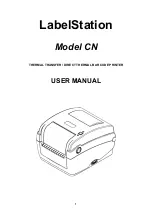
34
CLEANING AND MAINTENANCE
Danger of electric shock!
Before perfor-
ming any cleaning operations, the machine must
be turned off and disconnected from the mains
power supply. Never immerse the coffee maker in
water.
Important! Danger of burns.
Allow the
machine to cool down before cleaning.
Important!
•
Do not use solvents, abrasive detergents or
alcohol to clean the coffee maker.
•
None of the components can be washed in a
dishwasher.
•
Do not use metal objects to remove encrusta-
tions or coffee deposits as they could scratch
metal or plastic surfaces.
Emptying the drip tray
Important!
If the drip tray (A11) is not emp-
tied regularly, the water could overflow from the
edge and seep inside or around the machine.
This could damage the machine, the surface it
rests on or the surrounding area.
The drip tray has a water level indicator in the
form of a red float which rises up as the level of
water in the drip tray rises. Empty the drip tray
before the red float protrudes from the tray (fig.
18).
To remove the tray:
1. Open the service door (fig. 19);
2. Remove the drip tray and the grounds contai-
ner (Fig. 20);
3. Empty the drip tray and grounds container
(A9);
4. Remove the drip tray complete with grounds
container (A9);
5. Close the service door.
Cleaning the coffee maker
The following parts of the machine must be clea-
ned regularly:
-
water tank (A7),
-
drip tray (A11),
-
coffee grounds container (A9),
-
coffee spouts (A14) and hot water/cappuccino
maker nozzle (A15),
-
pre-ground coffee feed funnel (A4),
-
the inside of the machine, accessible after
opening the service door (A12),
-
infuser (A8),
Cleaning the water tank
1. Clean the water tank (A7) regularly (about
once a month) with a damp cloth and a little
mild washing up liquid.
2. After washing, rinse the water tank thoroughly
to remove all traces of washing up liquid.
Cleaning the drip tray
•
Clean the drip tray (A11) each time you empty
it using a damp cloth and a little mild washing
up liquid.
Cleaning the coffee grounds
container
1. Clean the grounds container (A9) each time
you empty it using a damp cloth and a little
mild washing up liquid.
2. Try to remove the toughest coffee encrusta-
tions with a toothpick. If this is not sufficient,
soften the encrustations by soaking the
grounds container in water for a few minutes.
Cleaning the spouts
1. Clean the coffee spout (A14), ideally each
time you use the coffee maker, with a sponge
or cloth (fig. 21).
2. Check regularly (about once a month) that the
holes in the coffee spout (A14) are not bloc-
ked. If necessary, remove coffee deposits with
a toothpick (fig. 22), sponge or stiff bristled
kitchen brush.




































